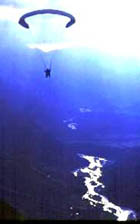|
When Columbus first
stepped on to the American continent, it was Venezuelan soil
he described as a 'Paradise on Earth' — the country has
been charming visitors ever since.
Venezuela's natural
wonders read like a Who's Who of ecosystems. They range from
the towering peaks of the Andes, through swathes of cloud
and rainforest, across vast plains and ancient mesa mountains
and onto miles of brilliant white beaches.
It covets huge reserves
of oil and minerals, astounding biological diversity, and,
perhaps most precious of all, incomparable water sources which
give life to its forests and plains, and light to its growing
cities.
Its population is
young, dynamic and friendly, elevating partying to new levels
and the pleasure principle to new heights: Venezuelans consume
more beer than any other Latin nation, and are among the world's
greatest whisky drinkers. Venezuela produces more Miss Worlds
than any other nation. Its people, even by Latin standards,
are hard to resist.
It is not an easy
country to pigeon hole. Anyone attempting to capture its essence
in the net of hasty generalisations does so at their peril.
In little over two generations, 'petrodollars' have brought
astronomic wealth to the country, transforming it from backwater
to the most 'Yankeefied' nation of the continent.
In Caracas, aircon,
cutting-edge architecture, luxury automobiles and designer
labels are de rigueur. At the other extreme you find Indian
peoples living lives little changed for centuries, deep in
dense jungles where there is no concept of the outside world;
sleepy villages down dusty backroads; or the poor who cling
to precarious lives on the hillsides of the country's vibrant
capital.
It is a markedly
urban society, yet the peasant culture of another era strangely
prevails. It is hyper modern, with muzak-wafted shopping malls
and swish Metros, yet surprisingly backward when it comes
to education and literacy. Venezuela boasts some of the continent's
most progressive environmental legislation and a fifth of
its land falls under some protection. But you'll see people
on the highways tossing trash from bus windows, and the country's
national obsession of coffee is served in millions of disposable
plastic cups each day.
For the visitor
to Venezuela, all these contradictions can be perplexing.
Discovering this northern South American nation is a life-long
ambition.
In the cities, it
can resemble a teenager determined to squeeze the last drop
from Life's rich fruit. In the countryside, it reminds one
of a sleepy grandfather who, his stories all told, takes his
siestas with a passion. It is rarely predictable, often challenging,
always rewarding.
There is no bottom
to the country's goodybag.
For birdwatchers,
the country's geographical setting on a main migratory highway
provides for more species than North America and Europe put
together.
Walks along jungle
paths, hikes up to icy peaks, dives in crystal waters, river
trips in dug out canoes and some of the hardest vertical climbs
in the world await the adventurous and energetic traveler.
Waterfalls are everywhere,
from staggering, kilometre-high Angel Falls, the world's highest,
to tiny sylvan emerald pools tucked away in the forest.
In Los Llanos,
rivers patrolled by snapping cayman crocodiles criss-cross
rolling plains dotted with families of capybara, the world's
largest rodent. Above, brilliant scarlet ibis and roseate
spoonbills light up the skies. The landscape's pistachio skin
stretches on for hundreds of miles, parched to dust devils
in the summer and drowned to lakes in the rainy season, peopled
by hardy yet lonely cowboys.
In the southeast,
the 'tepuy' mesa mountains of the Guiana Shield break the
horizon of savannah and forest like ancient Greek temples,
their flanks embroidered with white line waterfalls, their
tops the lair of the mawariton spirits of the indigenous Pemon
Indians.
High in the Andes,
soaring peaks circled by condors and eagles frame 'paramos'
brimming with rare and fragile flowers. Somnolent villages
perch on mountain spines, bound by winding byways and coiling
trails, where the best tried-and-tested mode of transportation
is a mule.
The coast is the
longest in the Caribbean Sea, and the Paria Peninsula, where
deserted horseshoe bays and palm-fringed pockets of paradise
dot the coastline, possibly its best kept secret.
On every corner,
a myriad of different colored faces meet. Cultures from African
slaves to 'criollo' whites; beliefs from indigenous Indians,
Asian esoterics to New Age surfers; influences North American
and European. All melt in a tropical cauldron of music, dance
and food. Like the country's rich and delicious chocolate,
the temptation to dip your finger in to taste is irresistible.
Venezuela's boom
years furnished it with extensive infrastructure, making it
a straightforward country to travel (though Spanish will always
be an advantage), where flights connect all the major cities
and comfortable 'executive' buses run all the important routes.
Tourism is a growth industry. The island of Margarita, 'the
pearl of the Caribbean', with its exclusive resorts and lively
nightlife, rivals any destination in the region, though you
shouldn't expect western standards of service even in up-scale,
five star accommodation.
While Venezuela
is captivating, and its laid-back, mañana mentality
seductive, patience and a sense of humor are as essential
as sun-block and good book.
Robert Louis Stevenson
implored us "to feel the needs and hitches of life more
nearly; to come down off this feather bed of civilisation,
and find the globe granite underfoot, and strewn with cutting
flints." The cutting flints are few and far between in
Venezuela, minor grazes suffered on the trail you blaze, not
excuses to stay in the hotel compound.
The rewards of
exploring Venezuela's hinterland, where strong regional and
traditional cultures prevail, or learning their rich, passionate
and often hilarious language are comparable only to the first
sip of a freshly-made fruitshake after a long day on the road.
Blessed with a
tropical climate, a youthful heterogeneous population and
a bubbling cultural melting pot, the biggest problem facing
the visitor to Venezuela isn't how many pairs of socks to
pack, but how to pack all of its wonders into a two-week vacation. |

Playa Puy-Puy, Paria Peninsula, Sucre State

Yekwana girl, Amazonas State

In Your Face - Caracas from Parque Central

Not so concrete jungle - Canaima National Park

Stone chapel of Juan Felix Sanchez, Merida State

Paragliding in the Andes with Natoura Tours

Travelling by canoe up to Angel Falls

Snap happy caiman

Los Roques

Boy in the Andes

Rainbow in the forests of El Pauji

"Caminante, no buscas el camino
El camino se hace al andar."
Antonio Machado
|















